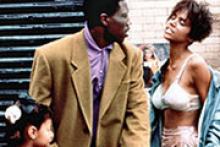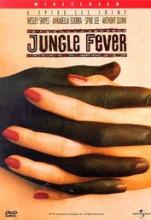Along with all the social commentary, Spike Lee’s Jungle Fever is rife with well defined characters – apart from the attempt to render an Italian family in realistic terms.
What’s made clear – but not until pretty far into the movie – is that while white racism is alive and well, but black folks even have to deal with degrees of pigmentation, a concept gone over in School Daze as well. Compounding that are the various characters attempting to explain this instance of jungle fever to their loved ones.
As a corner store managing schlub, John Turturro plays Paulie, the man ditched for Flip. Angie intones niceties that would work in most situations – she’s gotta get out of the neighborhood, she’s out grown him, etc. He seems to get it. And even winds up trying to date a customer, who happens to be black. Unfortunately, Paulie catches a beating from the local Italian ne’erdowells for his attempt at amour.
There are more riveting characters, though, in smaller roles.
Samuel L. Jackson plays Gator, Flip’s (Wesley Snipes) older brother. He’s a crackhead and does crackhead things like stealing his parents television and hocking it for drug money. And while that situation isn’t amusing when occurring in real life, it’s pretty funny in the film. Gator’s best scenes, though, involve him begging for money from Flip. While in the middle of a proper request for a few bucks, the character moves from plain speech into song and eventually starts dancing. Amazing.
Accompanying Gator is his girlfriend, Vivian (Halle Berry). She’s obviously a crack devotee as well. And when Flip meets her for the second time, she’s out on the corner offering up blowjobs for cash. It’s all in the interest of getting high, but still a disturbing – if not momentarily amusing – scene.
There’s an iteration of that encounter closing the movie, coming after Flip’s been momentarily reunited with his estranged wife, perhaps disavowing the probability that an interracial relationship is a worth while endeavor. Walking his daughter to school, the final moments of the film are given over to Flip casually talking to his kid just like every other day the duo takes the route.
They pause while coming up on a corner to wait out a light. A women approaches Flip and makes the same offer Berry’s character did earlier. And in traditional fashion, Lee attempts a grandiose and meaningful summation to his film with Flip grabbing the women, pulling her head to his chest, looking up and screaming ‘No!’ or some such similar phrase of disbelief.
If the movie wasn’t flawed up until this point, Jungle Fever’s closing scenes repudiate the thoughtfulness that preceded it. Bummer.







